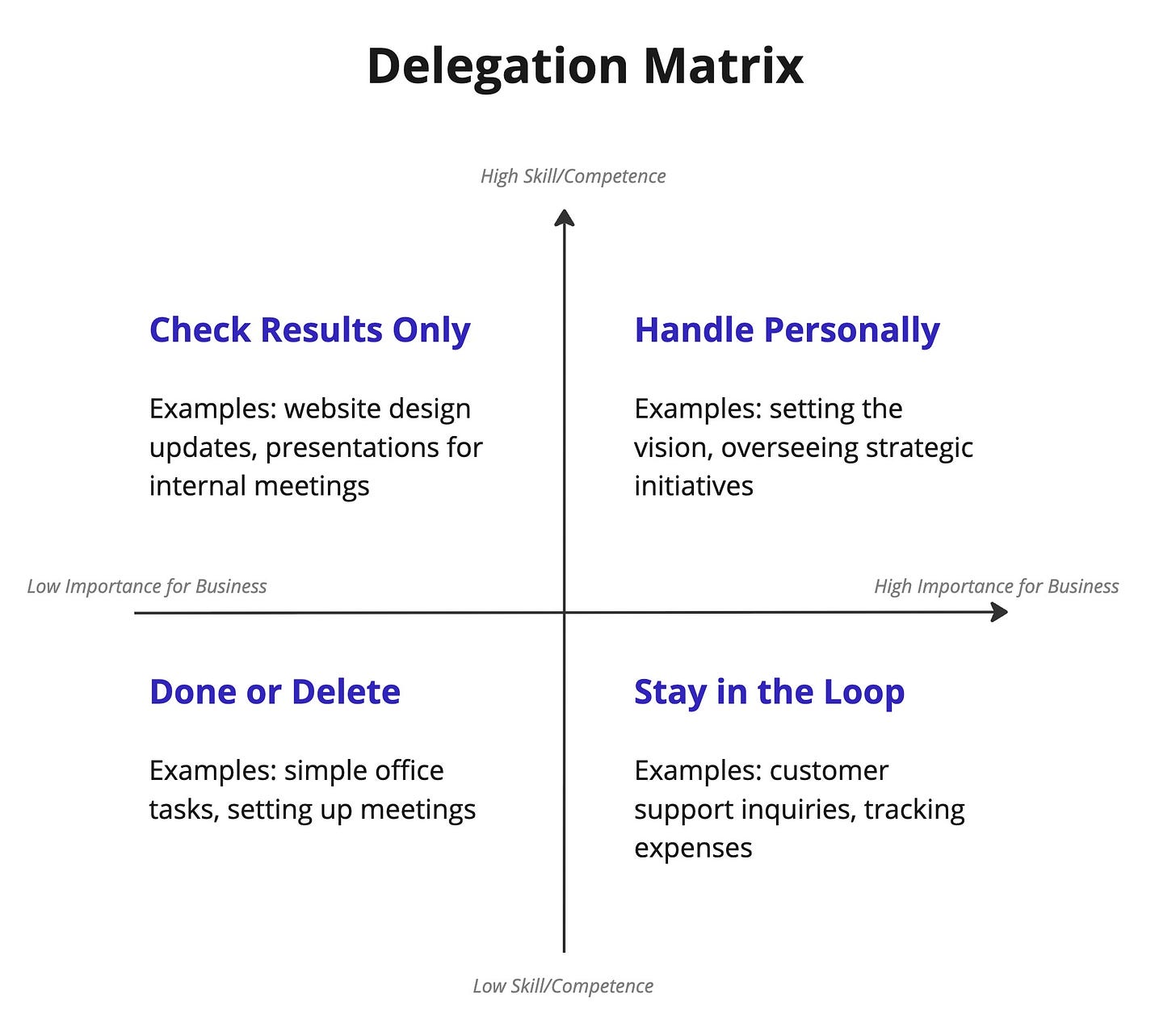Welcome to Meviss — a platform with personal development practices to help you achieve your career and business goals. Just 30 minutes a day—designed for real progress. Sent to your inbox every Thursday & Saturday. Sign up for free:
The Delegation Matrix framework to help you master delegation
The Delegation Matrix can help you figure out what to let go of—and what to hold onto.
It's structured around the idea that not all tasks are created equal, and the approach to delegation should vary depending on two key factors: the importance of the task for the business and the skill required to complete it.
Here's a breakdown of the 4 zones in this matrix:
Zone 1: Low importance for business + Low skill/competence
These tasks have little impact on the business and do not require much skill. They are typically administrative, routine tasks or low-value activities.
Examples: Organizing simple office supplies, scheduling internal meetings with no strategic value, responding to generic emails, arranging non-essential appointments, filing documents, setting up office events or birthday celebrations.
Delegation: These tasks can either be completely eliminated (if they aren’t necessary) or delegated to someone who doesn’t need specific skills or expertise.
Action: Done or Delete
Zone 2: Low importance for business + High skill/competence
These tasks require high-level skills or specialized knowledge but don’t significantly impact the core business objectives.
Examples: Proofreading marketing materials, check website updates, analyzing analytics reports, creating design layouts, conducting research on various topics.
Delegation: You can delegate these tasks to an expert or team member with the necessary skills. You will only need to check in to review the results without getting involved in the process.
Action: Informed Results (Check Results Only)
Zone 3: High importance for business + Low skill/competence
These tasks are important for the business but don’t require high-level skills or expertise. They may require consistent monitoring to ensure they stay on track.
Examples: Customer service inquiries, tracking inventory or supplies, coordinating basic project timelines, onboarding new employees, managing day-to-day operational logistics, tracking expenses.
Delegation: Delegate these tasks to someone with lower skill levels but make sure you are informed about their progress so you can provide support if needed. Regular updates or check-ins may be required.
Action: Informed Progress (Stay in the Loop)
4. Zone 4: High importance for business + High skill/competence
These are the most crucial tasks that require a high level of skill and are critical to the business’s success. As a leader, these are the tasks that you should handle personally or with a small team of highly skilled experts.
Examples: Setting the company vision, defining key strategic initiatives, making major business decisions (e.g., partnerships, acquisitions), overseeing product development, creating and managing company-wide budgets, leading negotiations with key clients or investors.
Delegation: These tasks should be owned by you, as they directly affect the business’s core operations and strategic goals.
Action: This is My Job (Handle Personally)
Here’s a quick visual representation of these zones:
Next steps
Braindump your tasks: Make a list of all the tasks you completed over the past week—both big and small. Review your calendar, check your notes or to-do lists, and write down everything you can remember. If something slips your mind, no worries—just start with what you have.
Assign a zone: Go through your list and assign each task to one of the four zones from the Delegation Matrix.
Review delegation opportunities: Once you've assigned tasks to the matrix, look for opportunities to delegate to see where you can offload or streamline to free up your time.
Recommended practices
Classifying tasks according to the Delegation Matrix is relatively easy, but you might hesitate to delegate due to fear—fear of losing control, of hiring the wrong person, or of the quality of work slipping.
Here are some subconscious practices that can help you address these fears and become more comfortable with delegation:
End Self-Blame for Lack of Progress with 15-Min Subconscious Practice
This subconscious practice works well when you struggle with over-control.
More subconscious practices will be added shortly.





